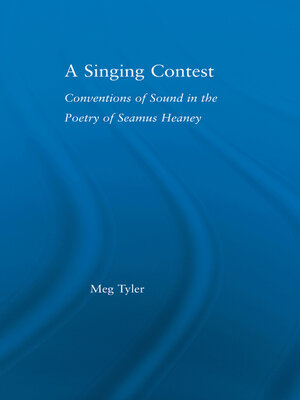A Singing Contest
ebook ∣ Conventions of Sound in the Poetry of Seamus Heaney · Studies in Major Literary Authors
By Meg Tyler

Sign up to save your library
With an OverDrive account, you can save your favorite libraries for at-a-glance information about availability. Find out more about OverDrive accounts.
Find this title in Libby, the library reading app by OverDrive.



Search for a digital library with this title
Title found at these libraries:
| Library Name | Distance |
|---|---|
| Loading... |
A formal analysis A Singing Contest comprises close readings of Seamus
Heaney's poetry. Tyler argues that in an era of fractured poetry and politics, Seamus Heaney stands out: his impulse is towards unity and regeneration. Her book considers the interplay between different kinds of literary tradition and community in his poetry. For Heaney, poetry represents a structure allowing imaginative mediation of conflicts that appear irreconcilable in the social, political and historical realms. By detailed structural analysis of diction, meter, imagery and generic form, Tyler illustrates how Heaney's poems create concords from discords, unities from fracture.
From the preface by Rosanna Warren:
A Singing Contest is written with imaginative and emotional urgency, and in some large sense, as it examines Heaney's spells, it seems itself to want to cast a spell against death. Hence Tyler's return, in various ways, to readings of elegy, whether the fictive elegies of classical pastoral poems, or Heaney's personal elegies. She pores in detail over Clearances, the sonnet sequence composed in memory of the poet's mother in The Haw Lantern, and she concludes her book with a chapter on literary elegies, Heaney's farewells to his friends and admired contemporaries Ted Hughes, Zbigniew Herbert, and Joseph Brodsky. In these analyses, one sees the wholeness of Tyler's project: her argument that for Heaney, literary tradition itself, rightly received and transformed, reaches into the voids made by death, and establishes connection across rupture. Her thesis is an ancient one, and she gives it particular shape and force in asking us to contemplate it at work in Heaney, where it binds individual to collective experience, and past to present.







